 |
 |
| |
|
|
| |
|
|
| |
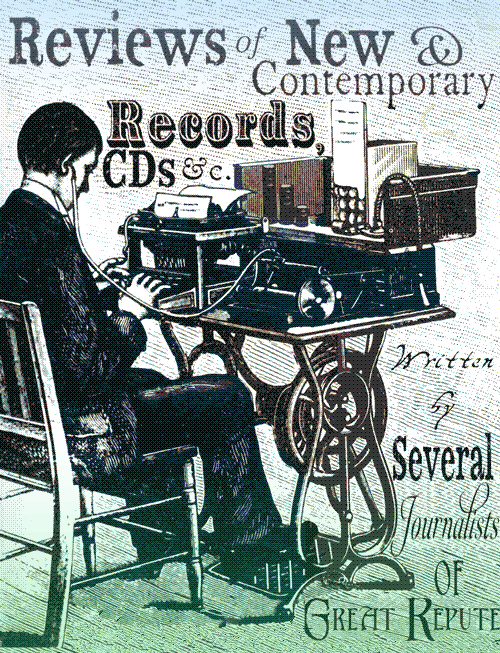 |
|
| =
January 2019 = |
|
|
| the Bevis Frond |
| NoSound |
| Paul
Roland and Mick Crossley |
| Superfjord |
| Sweetwater |
| |
| |
| |
| |
| |
| |
| |
| |
| |
| |
| |
| |
| |
| |
| |
| |
| |
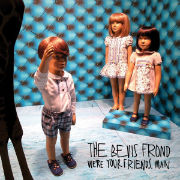
Home
|
THE
BEVIS FROND - WE'RE YOUR
FRIENDS, MAN
( LP/CD from Fire
Records )
One
of life's small pleasures is the release of a
new album by The Bevis Frond and it seems to my
ears that this particular album is one of the
most pleasurable collection that the band has
released, a wonderfully coherent album that
contains the perfect blend of quality tunes and
great guitar work all backed by a band working
in harmony.
Opening track “Enjoy” has a fine, meaty
guitar riff and some very honest Lyrics
wondering if it is all worthwhile (it is) and
hoping we will enjoy the album (we do), all
topped off with a fabulous solo that is
contrasted by the gentler title track, a lost
West Coast vibe running through it as it charms
your ears. After the garage rush of “Pheromones”
side one closes with the magnificent “Lead One”
a tune destined to be a Bevis classic with a
chiming riff, melodic hooks and plenty of solo
action for those who crave the sound of an
electric guitar unleashed.
Over on side two you can find a
collection of shorter tunes, the blistering “In
The Leaves” giving way to the softer and
nostalgic “Little Orchestras” a tune with great
lyrics and softly rippling guitar that floats
you away before “Growing” rocks you out again,
another rip-roaring Bevis tune that sticks in
your head delightfully.
Whilst Nick Saloman's lyrics have
always been personal, this album seems even more
so, the words maybe more accepting of life, a
recognition of getting older as demonstrated on
the beautiful “Venom Drain” a song you can get
lost in, the words quite possibly applying to
your life too.
On to side three, a collection of seven
shorter tunes that is quintessential Bevis, the
perfect mix ranging from the humorous psych-pop
happiness of “Gig Bag” to the guitar frenzy of
“Old Wives Tale” and the fabulous “When You Cast
Me Out” an album highlight for me, the side
rounded off by the moody psych of “And Relax” a
tune that drags you into its murky guitar
infested waters.
Of course it wouldn't be a Frond album
without a long freak out somewhere and side four
does not disappoint containing just three tracks
beginning with “The Steeple Doesn't Reach the
Sky” where Nick warms up the old axe before we
are teased and delighted by the lovely “Mad
Love”, a soft and lovely song that contrasts the
final song perfectly as we finally reach the
thirteen minute “You're On Your Own”, the band
joined by Bari Watts for one final blow, a
glorious early seventies style romp that every
fan will love, the first half consisting of some
down beat lyrics over a moody riff, laced with
guitar before the guitars just take over
completely, singing the emotions of the song,
howling and dancing in equal measure, just let
it wash over you and revel in the experience.
I have been listening to the songs of
Mr Saloman for a long time now and seems a
travesty that he is not recognised as one of our
finest songwriters/guitarists; this album being
one of his finest. (Simon
Lewis)
|
|
|
|
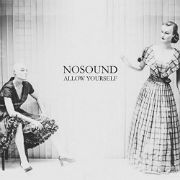
Home
|
NOSOUND
–
ALLOW YOURSELF
(LP/CD/DL
on KScope
Records)
Allow
Yourself is the sixth full-length studio album
by the Italian band Nosound, now relocated to
the UK. There
are scant few recording artists I know where I
can I say I like every
album they’ve made, even among my favorites, but
Nosound is one of those ultra-rare bands.
Would Allow Yourself maintain the streak?
Stay tuned.
Led
by the brilliant polymath Giancarlo Erra,
Nosound’s sound (didja like that one?)
incorporates post-rock, prog, and other styles
in which lovers of artists like Sigur Ros and
Radiohead will find much to treasure.
Its trademarks are melancholy electronic
soundscapes and Erra’s emotional vocals.
Allow
Yourself follows 2016’s “Scintilla” in reining
in some of the tendency towards longer tracks in
the past to more bite-sized pieces.
But with Allow Yourself, Giancarlo
continues to evolve his writing style.
He says, “The title Allow Yourself
reflects this need for change, freeing myself
from past stories and influences.”
Erra chose to incorporate elements of
electronica and downsize the sometimes Floydian
scope guitars and track lengths.
I’ll admit all of this gave me pause at
first, because I quite loved the sound of the
past albums, but I completely respect the
artist’s need to change.
The
new direction is most evident in the first
handful of tracks “Ego Drip,” with its looping
vocals, “Shelter,” and its electronic beats, and
“Don’t You Dare,” with elements of trip-hop.
After that, Erra seems to have gotten
most of the experimenting out of his system, and
the remaining eight tracks of the album are
mainly a return to the legacy Nosound.
Again, I value Erra’s desire to grow, but
I’ll admit once the album returned to the
melancholy sound textures and dreamy soundscapes
I felt like an old friend had come home.
Many of the songs on Allow Yourself end
abruptly, suggesting perhaps it wasn’t all that
easy to make changes to Nosound’s style.
“My
Drug” begins with a piano-based lamenting from
Erra with vocals that almost need no language to
convey their longing, before slowly building.
Album highlight “Miracle” is one of the
album’s moodiest, most haunting tracks, with
meandering synths and some very tasteful cello
blended in.
“This
Night” begins again with a plaintive piano and
Erra’s trademark echoing vocals.
His singing is always remarkable at
conveying an emotional longing, a reaching out
to someone out there who often doesn’t reach
back. Again,
the track builds and builds, Sigur Ros style, as
synths and strings weave around each other and a
drum beat ratchets up the tension, before
finally backing off at the end and a return to
the solitary piano theme.
“At
Peace” is almost a companion piece to “This
Night,” similar in style and rising and falling
dramatic intensity, the difference being the
major chords and lyrics denoting a sense of
personal serenity.
In true Nosound style, it’s all emotion
hanging out there.
“Saviour” is a beautiful piece, mostly
built around live strings, with more reaching
out from Erra “If I fall down…will you help
me…will you save me…will you heal me…will you
love me?” “Weights”
returns to the epic electronic soundscapes,
keyboard figures, and Erra’s stirring emotions,
with another post-rock buildup.
Allow
Yourself does indeed keep Nosound’s perfect
streak intact for me, due mainly to largely
returning to form after the initial experimental
tracks. Giancarlo
Erra is a true artist who has sculpted another
fine work.
(Mark
Feingold)
|
| |
|
|
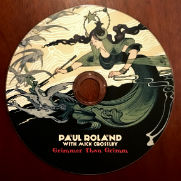
Home
|
PAUL
ROLAND
WITH MICK CROSSLEY – GRIMMER THAN GRIMM
(LP/CD from Dark
Companion Records )
For over 40 years Paul Roland has been releasing
albums full of tales concerning Victorian
villains, eccentric Edwardian inventors and gothic
supernatural tales, which he has decorated with
exquisite baroque psych and pop music
instrumentation, he has been compared to Robyn
Hitchcock and is considered by none other than
Frank Zappa to “write nice melodies and has a very
particular personality, but is far too
intellectual for me”!
Based on the fairy tales of the brothers Grimm,
‘Grimm’, released in 2011 is one of the strongest
albums in Paul Roland’s quite extensive catalogue.
Paul has long considered this album to be one of
his favourites, but it was an album on which he
played all the instruments himself, which he felt
lent it a kind of demo quality. Here it sees a
re–imagining; it now has much more of a
personality, this has been achieved by bringing in
guitarist Mick Crossley (Flyte Reaction,
ex- Woronzow Records) to add the parts that Paul
felt were missing and it works to great effect,
what Mick has done has elevated the songs without
overpowering them, he has added plenty of tasty,
sympathetic guitar lines where he felt that they
were needed, and he plays with plenty of taste,
never too showy, draping the songs with his fluid
playing.
The album starts with “Nevermore”, a short
introductory song of longing, Mick’s presence
being immediately felt, it has fine organ and
gentle female backing vocals which frame the song
well, “If the sun refuse to shine”, is the tale of
a king who takes to his bed, hoping for a cure to
his malaise. Mick invests this tune with crunchy
Leslie guitar lines, the song contains some nice
Vernon Elliott type woodwind. “A long time ago”,
an early highlight which sees Mick dropping tiny
pearls of liquid electric notes all over the show,
a peach of a song with terrific lyrics concerning
a crooked old house with deformed doors, leaning
windows and skewed stairs. This song alone is
worth the cost of admission, I absolutely adore
it. “Rapunzel”, the longest song on the album has
a sparseness of sound reflecting its simple fairy
tale structure, its message being don’t stray too
far from the path.
“What will become of me”, a calliope type tune
with plenty of synth, acoustic guitar, exposed
nerve guitar and female backing vocals by Rosie
Eade “Lowly weeps the king”, a ghostly madrigal is
well placed here, Rosie’s fine backing vocals and
restrained stinging lead guitar fills. “Maleen”,
sees Mick investing the tune with plenty of slide
guitar, very much in the style of Jesse Ed Davies,
whose playing elevated Gene Clark’s ‘No Other’ so
much, achieving a similar feel here. “The Devil’s
Bride”, stately peels of churchlike organ
introduce this macabre tale of marriage, with its
imagining of a flesh eating wedding feast, which
consists of a sole guest- the bride herself. “The
way of the world”, sees more fine slide guitar
playing by Mick, here Paul reminds me a little of
Al Stewart. “Once upon a time”, is another gem, an
acid folk style song. It concerns a malcontent
King and his three daughters; it has some great
percussion, vocals by Rosie and terrific lead
guitar throughout. The record ends with “Nevermore
(Reprise)”, which Mick imbues with some tasty
backwards guitar lines. It all adds up to a fine
album and one which I can’t recommend highly
enough.
(Andrew Young)
|
| |
|
|
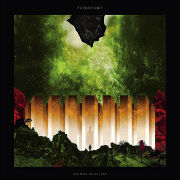
Home
|
SUPERFJORD
– ALL WILL BE GOLDEN
(LP/CD/DL on Svart
Records)
Finland’s Superfjord brings their second album,
full of lush prog and 70s style album rock. The
six tracks are all expansive workouts, on average
clocking in at eight to ten minutes, with lots of
space for the six-piece band led by singer,
songwriter and guitarist Jussi Ristikaarto to
stretch out in many different directions.
Reminding me a little of Gong, Frank Zappa,
Utopia, and, dare I say, a smidge of Alan Parsons
Project, the tracks feature lots of guitars,
synthesizers, some saxophone and percussion.
Did somebody say percussion? With many of the
band members listed as either primary, secondary
or tertiary percussionaires, the album can’t help
but be loaded with interesting rhythmic
possibilities.
Superfjord layers it on thick with overdubs,
creating a veritable smorgasbord of sound. On
overdubbing, Ristikaarto says “It’s like
constructing a mandala, or carving a
sculpture…We’re surgeons. Surgeons who every once
in a while like to use a sledgehammer or a nuclear
detonation.”
The songs are about 80% instrumental, 20% vocal.
That ratio is probably for the better, as the
vocals tend to be repeating chants or mantras
rather than traditional verse/choruses. OK,
vocals aren’t really their thing. But these guys
are all master musicians; the long instrumental
passages are great tickets for passage for the
mind on a trip through those super fjords.
Since the long tracks tend to transit different
styles in a prog mishmash, Superfjord is at their
best when they get into a flowing rhythmic groove
and then segue into a heavier guitar-based
section. My favorite tracks are “No Rest for the
Wicked” and closer “Rainha de Floresta.” On “No
Rest for the Wicked,” a bubbling synth rhythm
gives way to a rock groove, with lots of twists
and turns. “Rainha de Floresta” (“Queen of the
Forest” in Portuguese) casts many styles and
tempos out there in the spin cycle, before
settling and rocking to a galloping journey,
ultimately landing on some distant shore, with
birds chirping and waves gently crashing. Why,
I’m not sure, but it does sound good.
“All Will Be Golden” is one of those albums to
put on, sink back, forget about time, and let
Superfjord guide you where they will. You’re in
good hands.
(Mark Feingold)
|
| |
|
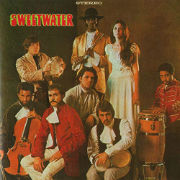
Home |
SWEETWATER
- SWEETWATER
(LP/CD/DL
on
Cherry
Red Records)
This
year
will see the 50th anniversary of
Woodstock, and the hype is already beginning.
There are two
competing anniversary festivals, one on the site
of the original fest, organized by the Bethel
Woods Center for the Arts, and the other run by
the original organizers, 150 miles away at
Watkins Glen NY (site of the 600,000 strong 1973
Watkins Glen festival).
We don’t know yet what’s cooking in the
way of commemorative album or film releases, but
you can bet there’ll be something grand.
When
you
think of Woodstock performances, there are five
basic categories:
1) Artists who were already huge and
further cemented their legend (Hendrix, The Who,
et al); 2) Artists who were new and Woodstock
helped rocket them to fame (Crosby, Stills, Nash
& Young, Santana); 3) Artists who were big
but played unmemorable performances (Grateful
Dead, Janis); 4) Artists who were established
and muddling along when their incendiary
Woodstock performances helped bump them up a peg
or two in music hierarchy (Ten Years After, Sly
& The Family Stone); and 5) Artists who were
relatively unknown both before the festival and
since.
It’s
this
last category that somewhat intrigues me, so
I’ve decided to cover a couple of these “other”
performers to see whether perhaps history and
the unforgiving music biz might’ve given them a
bum rap. I’ll
start with Sweetwater.
Sweetwater
was
an LA-based eight-piece outfit.
They were somewhat unusual for their
time, both for being so large, featuring such
instruments as flutes and cellos, and also for
being multi-racial and gender a la Sly’s brood.
They blended folk-rock, psych, pop, classical
and jazz featuring the lead vocals of Nancy
“Nansi” Nevins.
Their sound comes across somewhere on the
left side of the spectrum with Spanky and Our
Gang’s sunshine pop on one end, It’s a Beautiful
Day somewhere in between, and Jefferson Airplane
on the far side.
They
were
scheduled to open the festival Friday night.
However, they were delayed arriving, and
Richie Havens went on first, with Sweetwater
after them. During
their set, a band member tells the crowd, “We
were supposed to be on first today, but they
gave us a police escort here driving, and the
man had to stop and bust us all before he could
escort us here, so it took a little while.
But we’re on now, and as the Maharishi
said, in Indian (sic), “kick out the jams,
folks.”
Their
self-titled
1968 debut album was their sole release at the
time of Woodstock.
It’s an eclectic affair showcasing folk,
rock, psych, baroque, classical and jazz styles,
as well as Nansi Nevins’ charismatic vocals and
the band members’ instrumental talents.
Opener
“Motherless
Child” would likewise be their opener at
Woodstock. The
negro spiritual dates back to the days of
slavery in the US, with an early recording
dating all the way back to the 1870s by the Fisk
Jubilee Singers.
When Richie Havens completed his set and
Sweetwater hadn’t yet arrived, he was ushered
back on stage and told to keep going.
He improvised the now-iconic “Freedom,”
based on “Motherless Child” and can be seen in
the film, carried away with emotion caroming
around the stage among crew and crowd alike
before exiting still playing, to thunderous
applause from the 400,000 throng.
Sweetwater had to follow that.
They
opened with… “Motherless Child.”
The same song, played back-to-back by two
artists.
Anyhoo,
the
rest of the album goes in different directions,
with mostly originals.
“Here We Go Again” sounds like two songs,
one sunshine pop and the other like Broadway
show tune fare.
“For Pete’s Sake” (not the Monkees track)
is an instrumental (bar the “da da da” vocals)
and sounds like wonderful period movie
background music with groovy harpsichord, flute
and cello solos.
The ballad “Come Take a Walk” is more
sunshine pop with a great vocal by Nevins and
flute abounding.
“What’s
Wrong”
was a minor hit for Sweetwater.
With ensemble vocals and lyrics of social
consciousness, it was a sign of the times.
The up-tempo “In a Rainbow” features nice
vocals by Nevins and harmonies from the band,
with psychedelic lyrics.
Speaking of psychedelic, “My Crystal
Spider” is about an arachnid with eyes of
mercury and a web of paisley, and contains some
suitably trippy effects.
“Rondeau”
is
another instrumental baroque piece, full of “la
la la” vocals. “Two
Worlds” is springy up-tempo pop, while “Through
an Old Storybook” is about reminiscing about
simpler, happy childhood times.
On
December
8, 1969, Nansi Nevins was severely injured in a
car accident. One
of her vocal cords was damaged and she sustained
brain damage, which affected her for years
afterward. Although
she had recorded a couple of tracks for the
second album “Just For You,” the album suffered
both creatively and in performance, from her
absence. Sweetwater
had lost its mojo.
After one more album, 1971’s “Melon,” the
band called it a day.
Sweetwater reunited for Woodstock ’94
with three original members, including Nevins.
Plus, there was a made-for-TV movie about
their story on VH-1 in 1999, called “Sweetwater:
A True Rock Story,” which featured
Michelle Phillips as the older Nancy.
You can find it on YouTube.
The 2000 movie “Almost Famous,” about
writer Cameron Crowe’s days as a teenager on
tour covering rock bands features the fictitious
band Stillwater, but it is not based on
Sweetwater.
The
Fates
dealt Sweetwater a crushing blow with Nansi
Nevins’ car wreck.
They didn’t make it onto either of the
original Woodstock albums or the movie, and
their post-Woodstock output was disappointing
and short-lived.
(They finally surfaced with two tracks on
the 2009 Rhino six-disc Woodstock 40 set).
But you will find their 1968 debut well
worth your time, and they certainly deserve some
love in the 50th anniversary
remembrances.
(Mark
Feingold)
|
| |
|
| |
|
| |
|
| |
|
|
|

